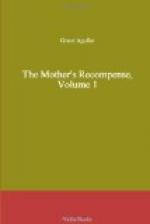“You have banished all thoughts of gloom, my dear aunt, and perhaps, instead of reading, I shall work and think on what you have said,” exclaimed Ellen, her cheek becoming more crimsoned than it was before, and exciting for the moment the attention of her aunt. She, however, soon permitted it to pass from her thoughts, for she knew the least emotion generally had that effect. Little did she imagine how those solitary hours were employed. Little did she think the cause of that deep blush, or guess the extent of comfort her words had bestowed on her niece, how they cheered the painful task the orphan believed it her duty to perform. Spite of many obstacles of failing health, she perseveringly continued, although as yet she approached not the end of her desires. No gleam of light yet appeared to say her toil was nearly over, her wish obtained.
The limits of our tale, as well as the many histories of individuals these memoirs of the Hamilton family must embrace, will not permit us to linger on the scenes of gaiety in which Caroline now mingled, and which afforded her, perhaps, too many opportunities for the prosecution of her schemes; Miss Grahame’s task was no longer difficult. Her confidence once given to another, she could not recall to bestow it upon her mother, from whom, the more she mingled in society, the more she became estranged; and Annie became at once her confidant and adviser. Eager to prove she was not the simple-minded being she was believed, Caroline confided her designs, with regard to St. Eval, to Miss Grahame, who, as may be supposed, heightened and encouraged them. Had any one pointed out to Caroline she was acting with duplicity, departing from the line of truth to which, even in her childhood, in the midst of many other faults, she had beautifully and strictly adhered, she might have shrunk back in horror; but where was the harm of a little innocent flirtation? Annie would repeatedly urge, if she fancied a doubt of the propriety of such conduct was rising in her friend’s mind, and she was ready with examples of girls of high birth and exemplary virtues who practised it with impunity: it gave a finish to the character of a woman, proved she would sometimes act for herself, not always be in leading-strings; it gave a taste of power, gratified her ambition; in short, flirtation was the very acme of enjoyment, and gave a decided ton before and after marriage.
St. Eval was not sanguine. But it was in vain he tried to resist the fascinations of the girl he loved, he could not for an instant doubt but that she encouraged him; he even felt grateful, and loved her more for those little arts and kindnesses with which she ever endeavoured to draw him from his reserve, and chain him to her side. Could that noble spirit imagine she only acted thus to afford herself amusement for the time, and prove her power to her companions? Could she, the child of Mr. and Mrs. Hamilton, act otherwise than honourably? We may pardon Lord St. Eval for believing it impossible, but bitterly was he deceived. Even her mother, her penetrating, confiding mother, was deceived, and no marvel then that such should be the case with a comparative stranger.




